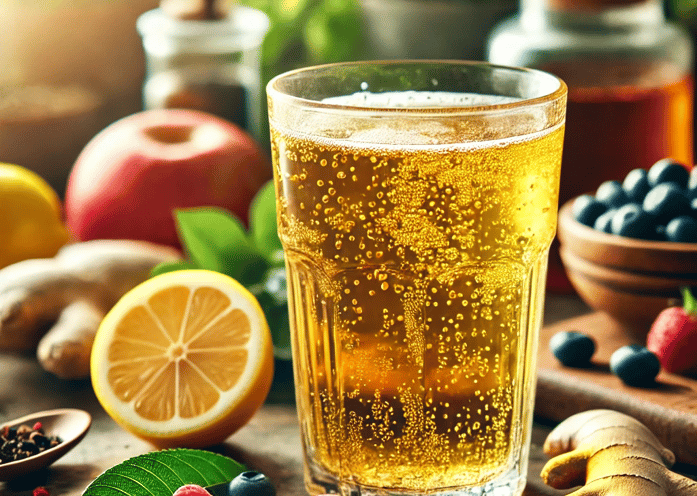Kombucha: What It Is, Why It’s Popular, and How to Enjoy It
Discover the fizzy, flavorful world of kombucha in this comprehensive guide. Learn what kombucha is, explore its health benefits, find top store-bought brands, and get a step-by-step recipe to brew your own at home. Packed with fun insights and practical tips, it’s your ultimate resource for all things kombucha!
1/8/20254 min read


1. Introduction
Kombucha is no longer just a niche health drink; it’s everywhere—from grocery store shelves to your favorite café. Known for its fizzy texture and tangy taste, kombucha has become a go-to option for those looking to shake up their beverage choices.
Why is it so popular? Many fans rave about its probiotic benefits, while others just love its unique flavors and refreshing fizz. Whether you’re sipping on it for health perks or just because it tastes good, kombucha is worth the hype.
2. What Is Kombucha?
Kombucha is a fizzy, fermented tea made from just a few simple ingredients: tea, sugar, and a SCOBY (symbiotic culture of bacteria and yeast). When brewed, the SCOBY eats the sugar in the tea, creating a tangy, slightly sweet drink with a natural carbonation.
Its flavor is a little hard to describe—it’s somewhere between sweet tea, vinegar, and soda. Some people call it an acquired taste, while others fall in love after the first sip. You’ll also find endless varieties, from ginger-spiked brews to fruity blends like mango or berry.
3. Health Benefits
Many people swear by kombucha for its potential health perks. Here are a few benefits backed by science:
Probiotics: Kombucha contains live bacteria and yeast, which can promote a healthy gut.
Antioxidants: Made from tea, it offers antioxidants that may help combat oxidative stress.
Digestion Support: The probiotics and organic acids in kombucha may support smoother digestion.
While kombucha can be part of a healthy lifestyle, it’s not a magic cure-all. Drink it as a tasty addition to your routine, not a replacement for good nutrition and habits.
4. Popular Kombucha Flavors
Kombucha flavors are as varied as the imagination of brewers. Some of the most popular options include:
Ginger-Lemon: A zesty, spicy blend perfect for a refreshing pick-me-up.
Mixed Berry: A sweet and tangy mix of blueberries, raspberries, or strawberries.
Citrus: Bright and bold, often featuring orange, lime, or grapefruit notes.
Lavender or Hibiscus: Floral and slightly sweet, these options feel fancy without the price tag.
For adventurous drinkers, homemade or specialty brews open the door to even more creativity. From pineapple-jalapeño to vanilla-chai, there’s a kombucha flavor for every palate.
5. Top 5 Kombucha Drinks on the Market
GT’s Kombucha
Pros: One of the most widely available kombucha brands. It offers organic options with a variety of flavors, including fan favorites like Trilogy and Gingerade.
Cons: Some flavors can be higher in sugar compared to other brands.
Health-Ade Kombucha
Pros: Known for its clean ingredients, glass bottle packaging, and bold flavor combinations like Pink Lady Apple and Jalapeño-Kiwi-Cucumber.
Cons: Smaller bottles and premium pricing may deter budget-conscious buyers.
5.3. Brew Dr. Kombucha
Pros: Offers low-sugar options with a smooth flavor profile, such as Clear Mind (mint, rosemary, sage) and Love (lavender, jasmine).
Cons: Lacks the strong carbonation that many kombucha fans enjoy.
5.4. Humm Kombucha
Pros: Budget-friendly and widely accessible, with flavors like Coconut Lime and Blueberry Mint.
Cons: Sweeter than traditional kombucha, which might not appeal to purists.
5.5. KeVita Sparkling Probiotic Drink
Pros: Light, refreshing, and low-calorie, with approachable flavors like Lemon Ginger and Mojito Lime.
Cons: Tastes more like sparkling juice than traditional kombucha.
6. Making Kombucha at Home (Step-by-Step Guide)
Brewing kombucha at home is easier than you might think. Here’s a simple process to get started:
Ingredients:
8 cups of water
1/2 cup sugar
4 tea bags (black or green tea)
1 SCOBY (available online or from a kombucha-making friend)
1 cup unflavored kombucha (starter tea)
Steps:
Brew the tea: Boil water, dissolve the sugar, and steep the tea. Let it cool completely.
Combine ingredients: Pour the cooled tea into a large glass jar. Add the SCOBY and starter tea.
Ferment: Cover the jar with a breathable cloth and secure with a rubber band. Let it sit at room temperature for 7-10 days.
Taste test: After a week, taste the kombucha. If it’s tangy enough, it’s ready for bottling.
Bottle and flavor: Remove the SCOBY, pour kombucha into bottles, and add any desired flavorings (fruit, spices, etc.). Let it sit for 2-3 days for natural carbonation.
Safety Tips:
Always use clean equipment to avoid contamination.
Discard any batch with mold.
7. Store-Bought Kombucha: What to Look For
If brewing at home isn’t your thing, store-bought kombucha is a great alternative. Here’s what to keep in mind:
Check the sugar content: Some brands load up on sugar, turning a health drink into dessert. Look for options with less than 10 grams per serving.
Look for live cultures: Authentic kombucha should contain live bacteria and yeast.
Inspect the label: Avoid brands with unnecessary additives or artificial flavors.
Quick tip: If the bottle says "pasteurized," it’s no longer a probiotic powerhouse.
8. Fun Ways to Enjoy Kombucha
Kombucha is versatile. Here are a few creative ways to enjoy it:
Straight up: Pour it over ice for a refreshing drink.
Mocktails and cocktails: Mix kombucha with fresh juice, herbs, or even a splash of gin for a fizzy twist.
In recipes: Use it as a tangy base for salad dressings, marinades, or even popsicles.
For kombucha skeptics, these fun options might just convert you.
9. Kombucha Myths and Misconceptions
Let’s bust a few common kombucha myths:
“It’s a cure-all!” Kombucha is healthy, but it’s not a miracle drink. Pair it with a balanced diet for the best results.
“It’s alcoholic!” While kombucha does contain trace amounts of alcohol (from fermentation), it’s far from boozy. Most store-bought versions are non-alcoholic.
“It’s dangerous to make at home!” With proper hygiene and care, homebrewing is safe and rewarding.
Inspiration
All products in this article can be found on amazon, any links which are clicked and subsequently purchased may provide us (flavorandfunction.com) with a small commission. Any commissions earned are reinvested to enable us to produce more articles and provide educational material to visitors to our site.
Innovation
Culinary
contact@flavorandfunction.com
+1234567890
© 2024. All rights reserved.
